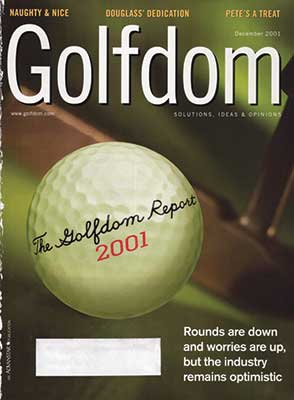Golfdom Files: A good time to get political

December 2001 cover (Photo: Golfdom archives)
It’s only fitting that the chaotic year of 2020 began with the coronavirus and is bookended by a contentious U.S. election. What this cultural and political moment has taught us is that whatever your personal views are, your participation in government is vital. In this article from the December 2001 issue of Golfdom, former columnist Joel Jackson, CGCS, advocates for superintendents to become involved in the political process and serve on local advisory boards. Some notable wins occurred in 2001: the reregistration of Nemacur (though we eventually said goodbye to that nematicide) and modifications to Florida’s water supply regulation. These showed it’s possible for the golf industry and regulators to come together on environmental issues — and that the work of educating legislators and the public must continue.
I will always remember 2001 as the year in the young 21st century when we learned a lot about the world, our government, our fellow citizens and ourselves. Many of us probably learned that we must be more involved in the decisions of our government if we want to live in a true democracy.
Everything we do is based on the workings of a free society, but sometimes we take that for granted. We don’t participate in the process as fully or as often as we could. It’s easy to get tunnel vision and focus on our immediate daily concerns and forget that we can make a difference in the big picture with a little effort and a sense of purpose.
That purpose became clear to me in 2001 as I discovered an enormous lack of knowledge about golf course operations among the ranks of legislators and regulators at all government levels. Travel budgets don’t allow them to get out from their desks like they should, so the gap between reality and their perception is huge. Their understanding is formed by computer models based on assumptions and activist groups.
With just a little effort, however, superintendents can help bridge that gap with real-world facts. When I meet with government leaders, I don’t hesitate to remind them that they serve all citizens — including those who use chemicals, fertilizers and water in their businesses. I also know that many government people are starved for information, and most will not shrink from the facts when they’re informed with them.
In fact, grassroots input from superintendents changed many government people’s assumptions in 2001. Case in the point: the reregistration of the nematicide Nemacur in early 2001. As superintendents told their stories to the EPA about using the chemical primarily for treating tees, greens and spot treating fairways, the EPA revised the acreage and pounds of product it had assumed were used on 150-acre golf courses. EPA’s models hadn’t been done with real numbers. Now, its leaders know the risk is considerably less than they imagined. They also learned that superintendents understand environmental concerns.
Another case in point: in Florida, like many states, drought-induced water shortages were in 2001 the year’s biggest news, as arbitrary day-of-the-week watering restrictions handcuffed turf and landscape managers. Inaccurately labeled as “big water users,” golf courses became easy political targets for restrictive measures.
To challenge these perceptions, several superintendents sought to fill that knowledge gap by serving on district water advisory boards. Their input and cooperation with water-management authorities was instrumental in changing attitudes among compliance and water supply managers. The superintendents secured modifications to the rules.
Once the crisis is over, the superintendents hope to make permanent changes to the emergency rules that will make good business and conservation sense for all.
Superintendents should always choose to be involved with the actions of their local governments, particularly when their livelihoods are at stake. Their ongoing involvement in their local governments will be required to educate new politicians and regulators who come and go.










